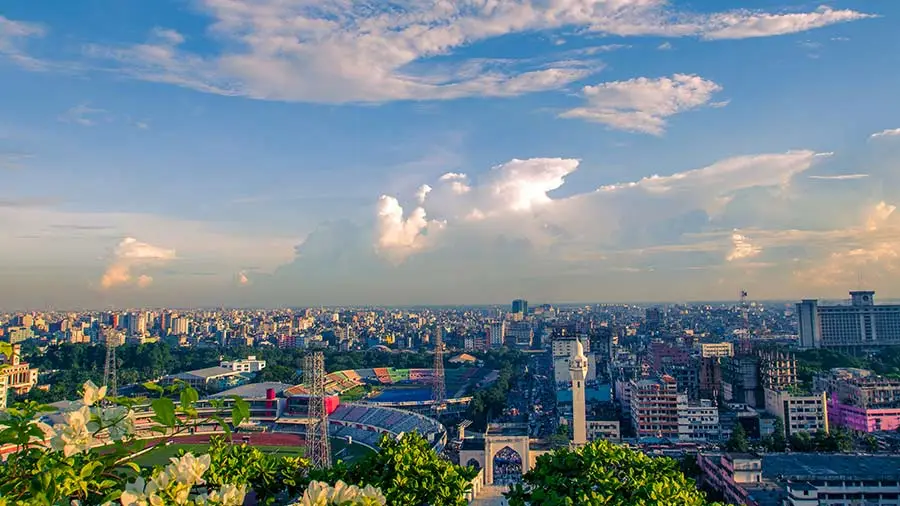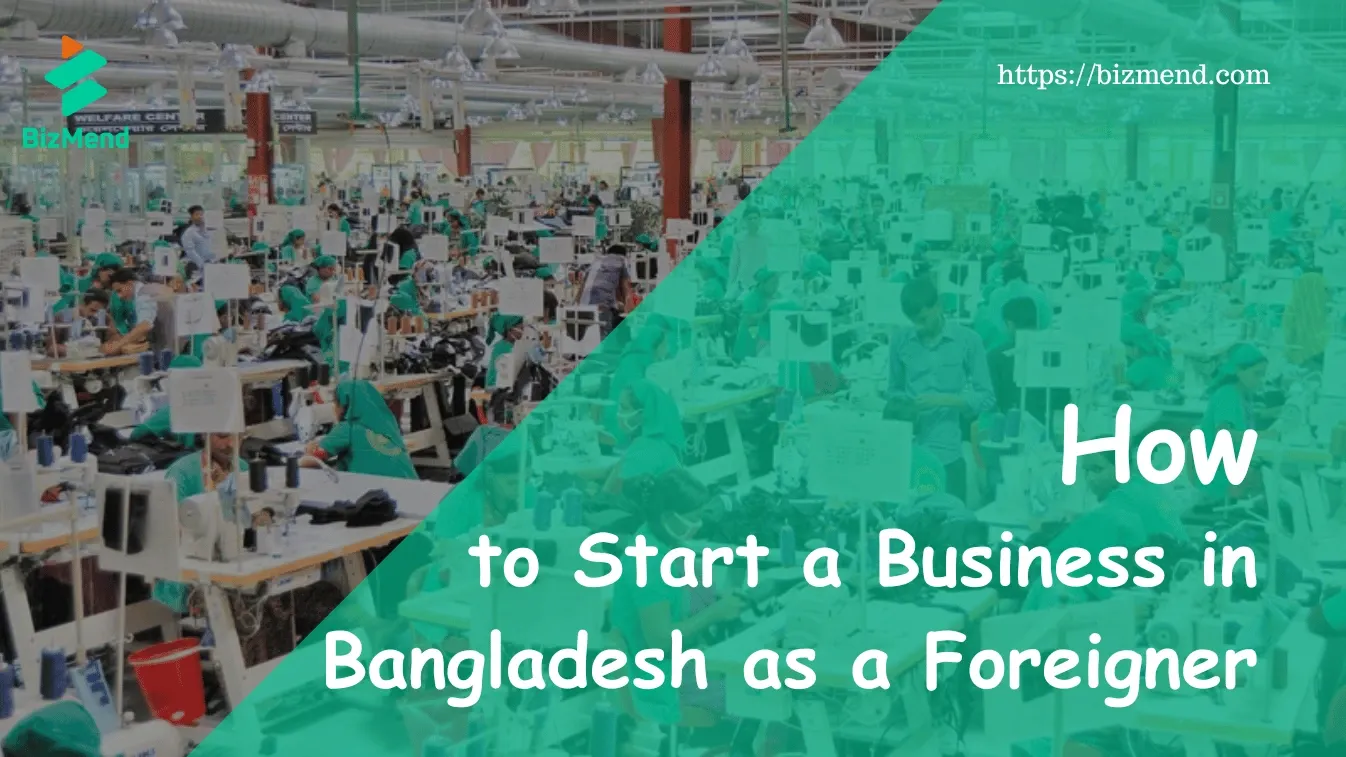“You can’t cross the sea merely by standing and staring at the water.”
— Rabindranath Tagore
If you’ve ever found yourself looking at Bangladesh on the map and wondering, “could I start a business there?”—This post is your step-by-step playbook on how to start a business in Bangladesh as a foreigner, from picking your structure to scoring your trade license.
Bangladesh isn’t flashy. It doesn’t market itself like Dubai. But behind the dust, traffic, and unapologetically chaotic beauty lies a rising entrepreneurial heartbeat. Whether you’re a digital nomad, investor, or someone wanting to turn ambition into action, Bangladesh is no longer just a manufacturing hub—it’s becoming a startup playground.
This is your real, no-jargon guide to starting a business in Bangladesh as a foreigner, from registration to biriyani-fueled business meetings.
Why Bangladesh? Why Now?

Bangladesh isn’t just about golden rice fields and colorful rickshaw art—it’s also one of Asia’s fastest-rising economies. With a growing middle class and a buzzing startup culture, the country’s momentum is hard to miss. The World Bank backs it up with steady GDP growth, while industries like textiles, agriculture, IT outsourcing, fintech, and e-commerce are charging ahead.
Here, you won’t just build a business—you’ll build resilience. If people here can launch empires from tin-roofed garages, you, dear reader, can certainly start from a modest office in Banani or a café in Chattogram.
Why Bangladesh? Consider These Factors at a Glance:
- 8th most populous country, means huge consumer market
- One of the fastest-growing economies in Asia
- Booming sectors: IT outsourcing, clothing or garments, fintech, agribusiness, and remittance-based services
- Strategic location between India, China, and Southeast Asia
- Rising middle class with digital adoption
And let’s not forget—Bangladesh birthed Grameen Bank, the world’s first microfinance revolution, turning poverty into entrepreneurship.
Can Foreigners Start a Business in Bangladesh?
Yes—with legal access, proper paperwork, and cultural patience, you absolutely can. But there’s a road you must follow, and it’s not always well-marked.
Whether you’re a non-resident Bangladeshi (NRB), a resident foreigner, or someone with zero prior links to the country, Bangladesh legally allows foreign-owned businesses. However, there are:
- No restrictions on foreign equity participation (you can own 100% except some specific sectors)
- No requirement to have a local partner (rules can vary in specific cases)
- But you must register your entity and obtain proper permissions, depending on your business type
Legal Requirements for Foreigners Starting a Business in Bangladesh
- Must register with RJSC (Registrar of Joint Stock Companies and Firms)
- Require MOA, AOA, and director/shareholder details
- Need at least two shareholders and two directors (can be foreign nationals)
- Must obtain a Trade License from the local city corporation
- Must apply for TIN (Tax Identification Number)
- VAT registration is mandatory if turnover exceeds BDT 3 million
- Foreign capital must be reported to BIDA (Bangladesh Investment Development Authority)
- Must open a bank account in Bangladesh for capital injection
- In some sectors, may require sector-specific licenses (e.g., BSTI, Import/Export)
- All documents must be submitted in English or Bengali, with notarized copies if foreign-issued
How to Start a Business in Bangladesh as a Foreigner: Step-by-Step Guide
Here’s the real, actionable path:
- Choose a Business Structure
You’ve got a few choices, depending on the size and scale of your ambition:
- Private Limited Company (Ltd.)
→ The go-to structure for most startups and SMEs
→ Requires 2 to 50 shareholders
→ Cannot offer shares to the public
→ Easier to manage, less regulatory burden
- Public Limited Company (PLC)
→ Requires at least 7 shareholders
→ Can issue shares to the public and get listed on the stock exchange
→ Requires prior clearance from the Bangladesh Securities and Exchange Commission (BSEC).
→ Heavier regulations, audit requirements, and capital standards
→ Suitable for large-scale enterprises, infrastructure, or industrial operations
Quick Note for Foreigners:
While foreigners can legally invest in a PLC, setting one up requires stricter scrutiny, pre-approval for capital markets, and coordination with both RJSC and BSEC. It’s not ideal for individual foreign entrepreneurs or small teams, especially without local legal assistance.
- Branch Office / Liaison Office
→ If you’re expanding an existing foreign company
→ Needs permission from Bangladesh Investment Development Authority (BIDA)
→ Cannot generate revenue without BIDA’s approval
- Joint Venture
→ A partnership between foreign and local stakeholders
→ Useful when local experience or distribution is critical
Quick Tip: If you’re testing waters in Bangladesh, a Private Limited Company is the most flexible and foreigner-friendly starting point.
- Name Clearance
Apply for the name clearance from the RJSC (Registrar of Joint Stock Companies and Firms).
- Company Registration with RJSC
Submit your:
- MOA & AOA (Memorandum and Articles of Association)
- Form IX, Form XII
- Passport copies of all directors/shareholders
- A registered address (commercial space is recommended)
It’s all online now, but yes, it still needs local follow-ups.
- Get a Trade License
Issued by the local city corporation. For example, in Dhaka:
- Fill out Form KA
- Submit rent deed, NID/passport, company papers
- Pay city taxes based on business type
- Tax Identification Number (TIN) or Business Identification Number (BIN)
These are mandatory for business operations, employee hiring, and banking. Apply through the National Board of Revenue (NBR).
- VAT Registration
Especially if your annual turnover exceeds BDT 3 million. Apply through the VAT portal of the Government website.
- Open a Bank Account
You’ll need:
- Incorporation certificate
- Trade license
- TIN certificate
- Passport & photos of directors
- Introducer letter (from another account holder in the bank)
Recommended banks for foreigners:
HSBC Bangladesh, Standard Chartered, Brac Bank, Eastern Bank Ltd.
- Capital Investment Reporting to BIDA
If you’re bringing in foreign capital, notify Bangladesh Investment Development Authority (BIDA).
They oversee:
- Repatriation of profit
- Capital remittance
- Approvals for branch/liaison office
Permits & Sector-Specific Licenses
Depending on your business type:
- Food/restaurant: BSTI license/certification
- Import/export: Import Registration Certificate (IRC), Export Registration Certificate (ERC)
- E-commerce: Post office license (yes, it’s still required)
For regulated sectors like environment, telecom, healthcare, or energy, special ministry approvals may be needed.
Legal Obligations & Penalties
Bangladesh’s business laws are strict if ignored. Some heads-up:
- Late annual return filing: Up to BDT 10,000 in penalties + daily fines.
- Unregistered employee payroll: Complete risk of shutdown and lawsuits.
- No VAT registration while operating: Legal notice + business suspension.
- Violation of repatriation rules: Currency control breach then serious trouble.
- Non-compliance with BSEC rules (for PLCs): Fines, blacklisting, even arrest in extreme cases.
This isn’t a country where you want to ignore the paperwork. It bites back.
Taxation & Finance Snapshot for Foreign-Owned Companies
- Corporate Tax: 27.5% (varies by sector, gets lower for green industries)
- VAT: 15% standard, 5% reduced for digital services
- Withholding Tax: Applies on rent, salaries, consultancy fees, etc.
- Dividend Tax: 20% (can vary with DTA agreements)
- Double Taxation Agreements (DTA) exist with 28+ countries (e.g., UK, India, UAE)
Bangladesh is friendly—until you skip paperwork. Don’t.
Quick tip: Hire a local CA (Chartered Accountant) or tax expert within 2 months of incorporation. You’ll thank yourself later.
Business Opportunities in Bangladesh for Foreigners
Let’s talk where the gold is buried:
- Garments & Textiles: backbone of the economy
- IT & Outsourcing: especially Dhaka’s startup scene
- Renewable Energy: solar projects in rural areas
- Import-Export: rice, jute, garments, fish
- E-commerce: rising fast, still room to lead
- Education & Skills Training: massive demand
Visa & Work Permit Basics
Yeah, about that, you need both—registration alone isn’t enough.
Types:
- Investor Visa – usually 1 year, extendable
- Work Visa – for foreign employees
- Tourist Visa – not valid for business registration
Apply through your nearest Bangladesh embassy, then report to BIDA locally.
Living & Business Life in Bangladesh
Let’s switch gears and talk real life—not just paperwork. What if you actually moved to the country with your business and everything? Then this part’s for you.
Where to Stay
- Expats prefer: Gulshan, Banani, Baridhara (Dhaka); Khulshi or Agrabad (Chattogram)
- Real estate websites: bproperty.com, pbazaar.com
Food Culture
- Don’t miss kacchi biriyani, shutki (fermented fish) (if you’re brave), and roshogolla.
- Tea isn’t just tea—it’s where business begins.
- Refusing tea? Consider it rude.
- Popular foreigner-friendly restaurants: Izumi (Japanese), Sajna (Indian), Le Méridien buffets
Shopping & Life Hacks
- Jamuna Future Park, Bashundhara City, and New Market (if you want local flair)
- Use bKash, Rocket, or Nagad for nearly every payment. The mobile wallet scene is strong.
- Join Expats in Dhaka (Facebook group)—a lifesaver
Internet & Connectivity
- Use Banglalink, Grameenphone, or Teletalk
- Set up broadband via reputed provider
- Electricity outages happen. Invest in a small UPS/inverter if you’re working remotely.
Business Etiquette & Culture
- Respect hierarchy. Even in startups, the senior’s word carries weight.
- A handshake is fine, but always greet senior officials with a light bow and nod.
- Don’t rush meetings. Building trust here often involves more than two rounds of tea and small talk.
- Dress formally—even in the heat.
- Language tip: Learn basic Bangla greetings.
- “Inshallah” is a common closer—take it as a polite “hopefully” not a business guarantee
- 1971 Liberation War: Not just history—it’s national identity. Respect and reference it wisely.
Incentives & Support for Foreign Investors
Bangladesh wants your business. Literally. You’ll find:
- Tax breaks or holidays for up to 10 years in priority sectors
- Export incentives (up to 20%)
- Repatriation of profits is legally protected
- Special Economic Zones (SEZs)—plug-and-play factories for investors
- Access to Bangladesh Bank funds for remittance-backed businesses
Still early-stage—but changing fast.
Challenges a Foreigner Faces When Starting a Business in Bangladesh

Let’s be honest—it’s not always smooth sailing. For all its promise, Bangladesh comes with its own learning curve. Here’s what most foreigners bump into:
- Bureaucratic Delays
Offices may say “next week,” but really mean “next month.”
Solution: Work with someone local who knows the system and can do the nudging.
- Language Gaps
While many officials speak English, street-level communication can be tricky.
Solution: Learn a few Bangla basics—or hire a fixer/translator for key steps.
- Changing Regulations
Rules can shift overnight—especially tax or import rules.
Solution: Stay updated via NBR, BIDA, and legal advisors.
- Cultural Misalignment
Directness may be seen as rude. Lack of small talk? Cold. Too fast? Distrustful.
Solution: Slow down. Show respect. Drink the tea.
- Infrastructure Glitches
Load-shedding, slow internet, or flooded roads in monsoon season can stall business.
Solution: Backup plans matter—from power banks to rainy season strategies.
Common Mistakes Foreigners Make
- Assuming English fluency: It’s common in corporate zones, not in government offices.
- Ignoring local bureaucracy: You’ll need patience—and a reliable local fixer.
- Operating without proper VAT/TIN: Easy to miss, but fatal in the long run.
- Ignoring deadlines: even if the system feels slow
- Disrespecting local customs: religion, food customs, or national pride
Final Thoughts
Ready to put these steps into action and start a business in Bangladesh as a foreigner? Here’s how we can help.
To be honest, Bangladesh is not for the faint-hearted. It’s intense. It’s layered. It’s human.
But for those who take the time to learn—really learn—the reward is deeper than just business growth. It’s the connection, the loyalty, the tea stall that remembers your name.
Yes, it’s humid. Yes, there are traffic jams. And yes, sometimes the internet will vanish mid-Zoom calls. But this is also the land of resilient youth, roaring rickshaws, and entrepreneurship born from necessity. If you come here with respect, knowledge, and long-term intent—Bangladesh will open its doors.
Remember, you’re not just opening a company. You’re entering a rhythm.
FAQ
How much does it cost to start a business in Bangladesh as a foreigner?
It really depends on the kind of business you’re starting, but for most foreign-owned private limited companies, you’re looking at a minimum initial cost of around $1,500 to $3,000 USD. This includes government fees, legal help, trade license, TIN, VAT registration, and your local setup. If you’re renting a physical office or bringing in foreign capital, that adds to the total. Bangladesh doesn’t demand big capital—but it does demand clean documentation.
How a foreigner can invest in Bangladesh?
As a foreigner, you can invest directly through equity participation, joint ventures, or even set up a wholly foreign-owned company—all legal and supported. The Bangladesh Investment Development Authority (BIDA) is your main gateway. If you’re bringing in money from abroad, it must come through official banking channels, and you’ll need to report the investment to BIDA. A local bank account and proper documentation are non-negotiable—but once you’re in, you have full rights to repatriate profits.
How can a foreigner start a business in Bangladesh?
Step one: choose your structure—most foreigners go for a Private Limited Company. Then, register your company with the RJSC, get your trade license from the local city corporation, and apply for TIN and VAT. If you’re investing capital from abroad, notify BIDA and open a local bank account. It may sound like a lot, but if you’ve got a good local partner or legal advisor, it’s entirely doable without setting foot in a government office.
Is it good to start a business in Bangladesh?
If you’re looking for fast-growing markets, low operational costs, and raw potential, then yes—Bangladesh is more than good. It’s quietly powerful. The country has a rising middle class, a digitally connected youth population, and sectors like garments, tech, and agriculture that are ready for disruption. But it’s not plug-and-play — success here comes to those who respect the system, build local trust, and adapt to the pulse of the place.










